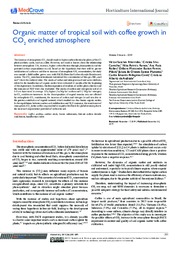Organic matter of tropical soil with coffee growth in CO2 enriched atmosphere.
Organic matter of tropical soil with coffee growth in CO2 enriched atmosphere.
Author(s): RIBEIRINHO, V. S.; CARVALHO, C. S.; RAMOS, N. P.; PACKER, A. P.; MILORI, D. M. B. P.; SANTOS, J. de O.; CERRI, C. E. P.; ANDRADE, C. A. de
Summary: The increase of atmospheric CO2 should result in higher carbon fixation by plants of the C3 photosynthetic cycle, such as coffee. However, not much is known about the relationship between atmospheric CO2 increase, higher carbon fixation through photosynthesis and the potential carbon sequestration in soil. Based on the hypothesis that there will be greater stabilization of carbon in soil due to increase of atmospheric CO2 concentration, the study was carried a field coffee grown area with FACE (Free-Air Carbon dioxide Enrichment) system. The CO2 enrichment treatment maintained the concentration of this gas 200 ?mol mol-1 above the ambient value. The stocks of carbon and nitrogen in soil and some attributes related to the humification of organic matter were evaluated 43 months after the beginning of the experiment. In addition, the decomposition of residues of coffee plants (leaves) and the emission of N2O were also evaluated. The stocks of carbon and nitrogen in soil of at 0-5 cm layer were in average 18% higher (2.6 Mg ha-1 carbon and 0.2 Mg ha-1 nitrogen) in CO2 enrichment treatment. As the decomposition of vegetal remains was not affected by atmospheric CO2 enrichment, the increase of carbon and nitrogen in soil was due to the greater contribution of vegetal material, which resulted in a less humic organic matter. In the equilibrium between carbon soil stabilization and N2O emission, the enrichment of atmospheric CO2 in the coffee crop resulted in negative feedback for global warming due to the increased sequestration potential of carbon by soil.
Publication year: 2019
Types of publication: Journal article
Unit: Embrapa Environment
Observation
Some of Embrapa's publications are published as ePub files. To read them, use or download one of the following free software options to your computer or mobile device. Android: Google Play Books; IOS: iBooks; Windows and Linux: Calibre.
Access other publications
Access the Agricultural Research Database (BDPA) to consult Embrapa's full library collection and records.
Visit Embrapa Bookstore to purchase books and other publications sold by Embrapa.

